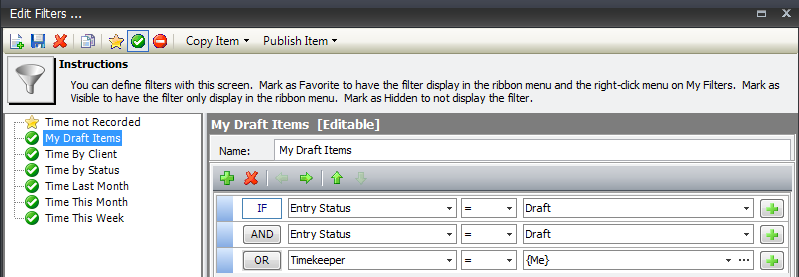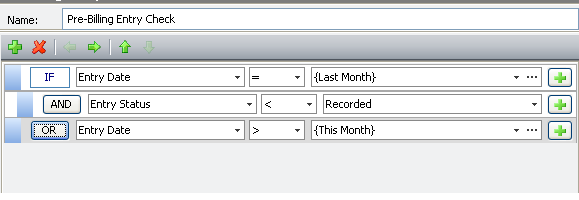Filter examples
The best way to understand the use of Filters is to look at some examples of how to add conditions that return the results you need.
Example 1: My entries
Show me all entries where I am the timekeeper.
To show all entries where you are the timekeeper, the condition would be:
If Timekeeper = {Me}
This statement results in all entries where {Me} is the timekeeper. The value {Me} is pulled from the system and is equal to the person is who is currently logged in. This means that the filter could be published for all to use, since the value {Me} would automatically change based on who is currently logged in.

Example 2: My entries today
Show me all entries I entered today.
To show all entries you entered today, the condition would be:
If Entry Date = {Today}
AND Creator = {Me}
First, this statement eliminates all items whose entry date is not equal to {Today}. The value {Today} is pulled from the system date of the machine. Next, the filter eliminates all entries where the Creator (the person who entered the entry) is not equal to {Me}. The value {Me} is pulled from the system and is equal to the person is who is currently logged in.
This filter could be published for all to use, since the value {Me} would automatically change on each machine based on who is currently logged in.

Example 3: My draft items
Show me all entries in draft status where I am the timekeeper or where I entered the entry.
To show all entries with a status of Draft that either (a) you entered or (b) you are the timekeeper; the condition would be:
If Entry Status = Draft
AND Creator = {Me}
OR Timekeeper = {Me}
First, this statement eliminates all items whose entry status is not equal to Draft. Notice that the term Draft is not in brackets since it is a static value and not a variable that pulls from the system. Next, the filter eliminates all entries where EITHER the Creator (the person who entered the entry) is not equal to {Me} OR where the Timekeeper is not equal to {Me}. That leaves only entries where the status is Draft and the Timekeeper or the Creator is equal to the person currently logged into Juris Suite.
The value {Me} is pulled from the system and is equal to the person is who is currently logged in.
This filter could be published for all to use, since the value {Me} would automatically change on each machine based on who is currently logged in.

Example 4: Pre-billing entry check
Before I run prebills for the prior month, I like to make sure that all time for that time period has been submitted to the billing department. I also like to make sure no one has accidentally entered any time for a future date that would not be found with their normal filtering. Can I run one filter to return all of those records?
This filter is more complicated, since there are two different conditions based on Creation Date. This requires the use of indentations to assure that the filter applies the conditions correctly. The conditions would be:
IF Entry Date = {Last Month}
AND Entry Status < Recorded
OR Entry Date > {This Month}
The indention of the AND condition in this example designates that it is a sub-condition of the previous, left-justified condition.


